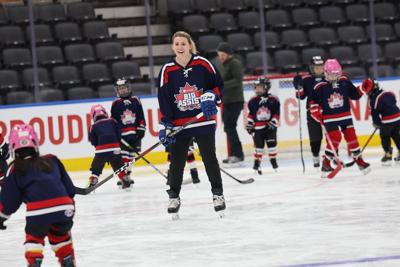Hayley Wickenheiser started practising her autograph early.
She signed it over and over as a kid in Shaunavon, Sask., preparing to fulfil her dream of winning a Stanley Cup with the Edmonton Oilers. She didn’t know another girl playing hockey until she was 10, and she didn’t dream of playing women’s hockey at the highest level until she watched the first world championship in 1990 at age 11.
Decades later, Wickenheiser is the author of one of the greatest careers in Canadian hockey. The game took her to the women’s national team, where she won five Olympic medals and set the program’s all-time international scoring record. It also took her to Finland, where she became the first woman to score in a professional men’s league.
But for all the places the game has taken her — including to the front office of the Maple Leafs, where she is an assistant general manager — Wickenheiser is excited by the prospect of a simplified journey to pro hockey for young girls.
That’s coming closer to fruition with the Professional Women’s Hockey League, which played its first game on New Year’s Day and has since set, then broken, the single-game attendance record for pro women’s hockey.
Nearly three million Canadians tuned in to the season opener between Toronto and New York, which was broadcast across CBC, TSN and Sportsnet. The game averaged a combined 879,000 viewers.
Toronto, playing at the 2,539-seat Mattamy Athletic Centre, has sold out its home schedule.
“It’s nice to see it kick off with a big bang,” Wickenheiser said. “(It’s) great for the little girls out here today to have a dream, not just for boys, that, ‘I can make a living being a pro hockey player one day.’ I did it through my career, but it was in a very different way … I had to piece a lot of my career together.”
You might be interested in
Wickenheiser spoke to the Star at the Kruger Big Assist event Sunday at Scotiabank Arena, where kids aged five to eight practiced on the ice alongside former pros Wickenheiser and Angela James. The Big Assist program will donate $200,000 to five hockey associations across Canada to help remove barriers to the game.
“It’s harder working with these kids than it is with the pros,” Wickenheiser joked.
The push to make hockey more accessible is important to Wickenheiser. She said she’s concerned by the increasing cost of the sport — especially with global warming shortening the length of the outdoor skating season.
With few domestic opportunities during her playing career, Wickenheiser instead went to Finland to play with men, scoring one goal and adding three assists in 22 games over two seasons.
“I squeezed every ounce out of my career that I could. I went literally to the end of the world to play,” Wickenheiser said. “It would’ve been nice to make a salary playing hockey, yes. I did it in my own way through my career. But I think that’s just the evolution of the game. Ten years from now, those players will be making hopefully six figures, seven figures to play the game.”
She said she has no sense of regret over the league not being around when she played.
“Maybe I wish it could’ve happened sooner when I was playing, but everything happens for a reason,” Wickenheiser said.
Her dream of winning a Stanley Cup is still alive, although it looks different from her perch in the Leafs’ front office. The time spent practising her autograph still comes in handy, too. As she made her way back to the rink in her blue jersey with red and white stripes, a fan stopped her.
“You’re amazing,” he said, Sharpie in hand.













Anyone can read Conversations, but to contribute, you should be a registered Torstar account holder. If you do not yet have a Torstar account, you can create one now (it is free).
To join the conversation set a first and last name in your user profile.
Sign in or register for free to join the Conversation